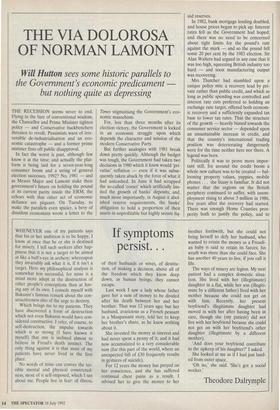If symptoms
persist. . .
WHENEVER one of my patients says that his or her ambition is to be happy, I know at once that he or she is destined for misery. I tell such seekers after hap- piness that it is not a target to be aimed at like a bull's-eye in archery; whereupon they invariably ask what it is, if it isn't a target. Here my philosophical analysis is somewhat less successful, for mine is a mind more adept at the destruction of other people's conceptions than at hav- ing any of its own. I console myself with Bakunin's famous remark about the con- structiveness also of the urge to destroy. Which brings me to my patients. They have discovered a form of destruction which not even Bakunin would have con- sidered constructive. I refer, of course, to self-destruction, the impulse towards which is so strong (I have known it myself) that one is inclined almost to believe in Freud's death instinct. The only thing against it is that most of my patients have never lived in the first place.
No words of mine can convey the ter- rible mental and physical constricted- ness, most of it self-imposed, which I see about me. People live in fear: of illness, of their husbands or wives, of destitu- tion, of making a decision, above all of the freedom which they know deep down, as human beings, they cannot escape.
Last week I saw a lady whose father gave her a sum of money to be divided after his death between her and her brother. That was 12 years ago; but her husband, avaricious as a French peasant in a Maupassant story, told her to keep her brother's share, as he knew nothing about it.
She invested the money at interest and had never spent a penny of it; and it had now accumulated to a very considerable sum (for this part of the world, where an unexpected bill of £30 frequently results in gestures of suicide). For 12 years the money has preyed on her conscience, and she has suffered continual chest pains as a result. I advised her to give the money to her brother forthwith, but she could not bring herself to defy her husband, who wanted to retain the money as a Freudi- an baby is said to retain its faeces; his wrath was more than she could face. She has another 40 years to live, if you call it life.
The ways of misery are legion. My next patient had a complex domestic situa- tion. She lived with her (illegitimate) daughter in a flat, while her son (illegiti- mate by a different father) lived with her mother because she could not get on with him. Recently, her present boyfriend's illegitimate daughter had moved in with her after having been in care, though she (my patient) did not live with her boyfriend because she could not get on with her boyfriend's other daughter (illegitimate by a different mother).
'And does your boyfriend contribute to the upkeep of his daughter?' I asked.
She looked at me as if I had just land- ed from outer space.
'Oh no,' she said. 'She's got a social worker.' ,
Theodore Dalrymple


















































 Previous page
Previous page